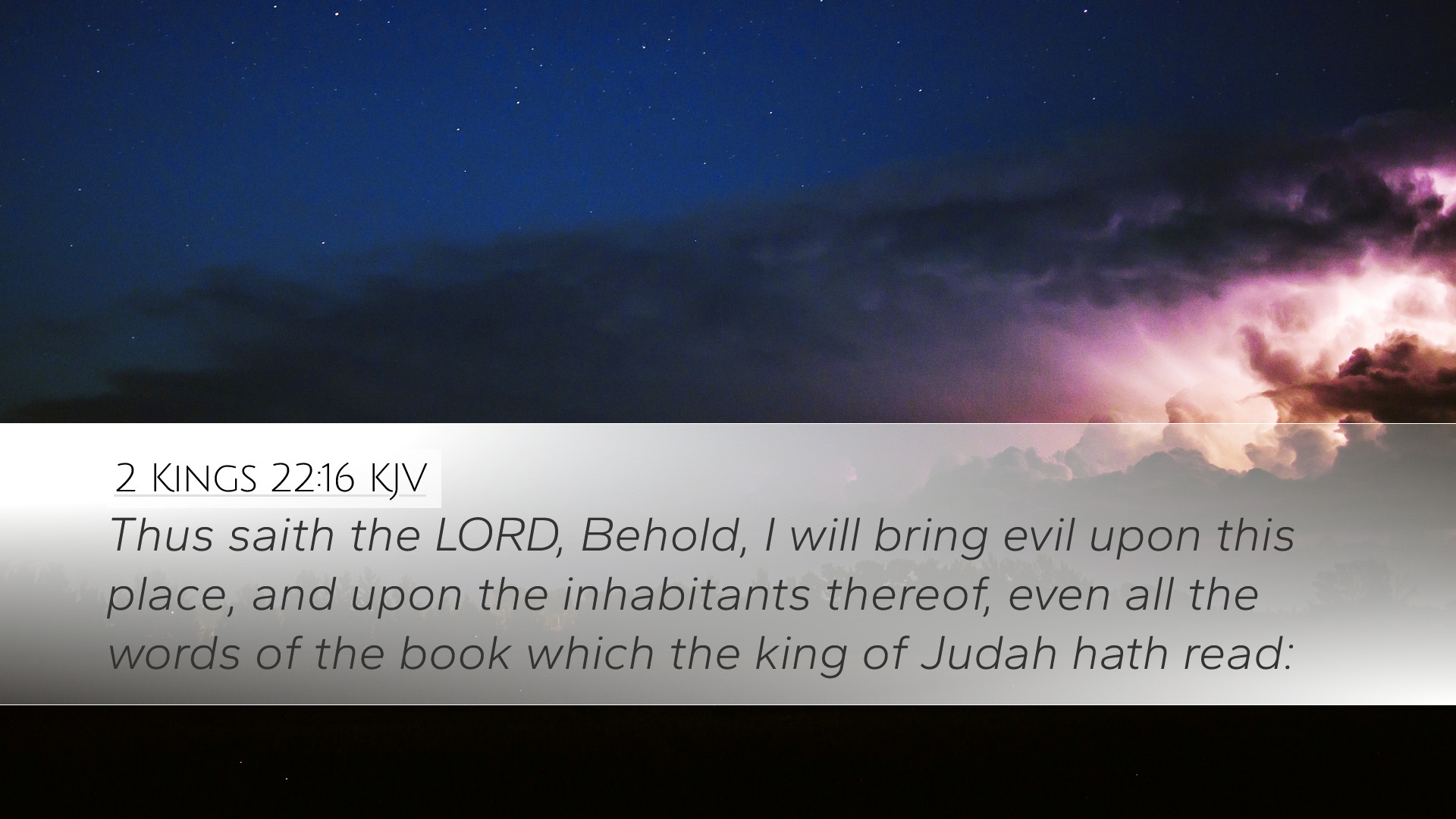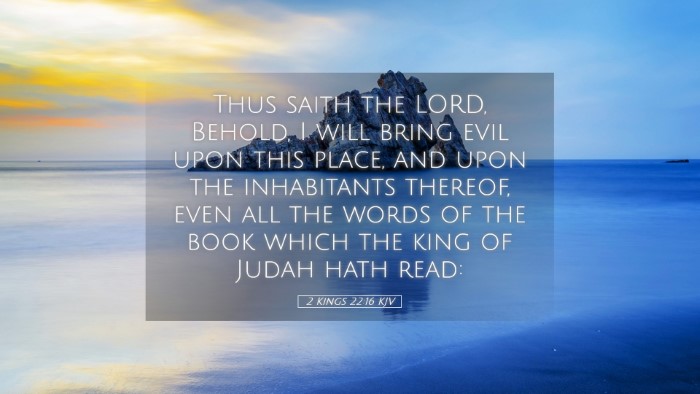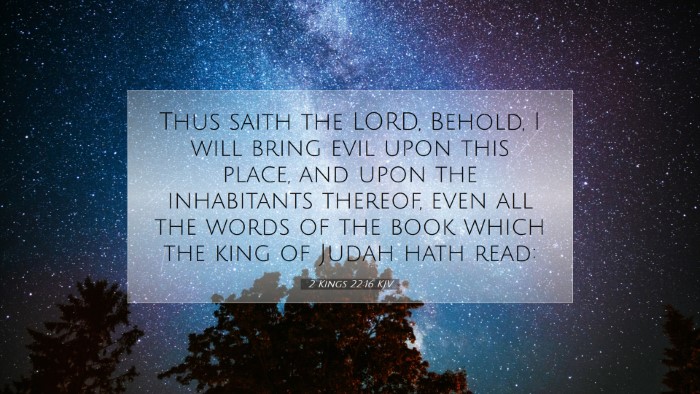Old Testament
Genesis Exodus Leviticus Numbers Deuteronomy Joshua Judges Ruth 1 Samuel 2 Samuel 1 Kings 2 Kings 1 Chronicles 2 Chronicles Ezra Nehemiah Esther Job Psalms Proverbs Ecclesiastes Song of Solomon Isaiah Jeremiah Lamentations Ezekiel Daniel Hosea Joel Amos Obadiah Jonah Micah Nahum Habakkuk Zephaniah Haggai Zechariah Malachi2 Kings 22:16
2 Kings 22:16 KJV
Thus saith the LORD, Behold, I will bring evil upon this place, and upon the inhabitants thereof, even all the words of the book which the king of Judah hath read:
2 Kings 22:16 Bible Commentary
Commentary on 2 Kings 22:16
Verse Context: 2 Kings 22:16 records a pronouncement of judgment from the Lord through the prophetess Huldah, highlighting a crucial moment in Israel's history. This event unfolds during the reign of King Josiah, a period marked by spiritual reform and rediscovery of the Law of Moses.
General Themes and Insights
The passage addresses themes of divine judgment, the necessity of repentance, and God's faithfulness. Following the discovery of the Book of the Law in the temple, Josiah seeks the Lord through Huldah, leading to a revelation of God’s impending wrath against Judah’s sins.
Key Elements of the Passage
- Divine Communication: Huldah serves as God's mouthpiece, a reminder that He speaks to His people through chosen vessels. This reflects God's desire for relationship and communication with His people.
- The Role of the King: Josiah's decision to seek counsel shows his humility and willingness to turn to God, contrasting with the idolatry and apathy of previous kings.
- Judgment and Mercy: While God declares judgment for Israel's sins, He also acknowledges Josiah’s repentant heart and reverence towards His Word, showing that individual righteousness can lead to personal mercy.
Commentary Insights
Matthew Henry’s Commentary
According to Matthew Henry, the passage emphasizes the seriousness of sin and the responses of God to the faithful. He highlights that God’s judgment, while deserved, is tempered by His mercy towards those who genuinely seek Him. Henry points out that Huldah’s message serves as a wake-up call to an idolatrous nation.
Albert Barnes’ Commentary
Albert Barnes elaborates on Huldah’s prophetic authority, emphasizing the role of women in God’s plan. His commentary discusses how Josiah's proactive approach in seeking divine guidance showcases a model for leaders who desire to lead their people towards righteousness. Barnes also notes the significance of the rediscovery of the Law as a catalyst for spiritual awakening and reform in Israel.
Adam Clarke’s Commentary
Adam Clarke stresses the importance of the Law in shaping Israel's identity and morality. He remarks that the discovery of the Book of the Law served as a pivotal moment in Josiah's reign, initiating a series of reforms that aimed to realign the nation with God's covenant. Clarke also draws attention to the consequences of neglecting divine ordinances and encourages readers to heed God’s warnings as reflected in the passage.
Theological Implications
This passage invites deep theological reflection on the nature of God’s justice and mercy. It underscores the belief that while God is just and must address sin, He remains merciful towards those who genuinely repent. Furthermore, it invites leaders and individuals alike to seek the Lord in times of spiritual need, reinforcing the belief that God's voice can still be heard amid societal sinfulness.
Application for Today
For contemporary readers, particularly pastors and theologians, this passage is a reminder of the vital importance of Scripture in guiding our lives and the lives of congregations. The rediscovery of God's Word can spark revival and reformation, both personally and communally.
- Embrace Humility: Like Josiah, believers are called to approach God's Word with humility, recognizing the need for divine guidance in a world filled with conflicting moral voices.
- Pursue Righteousness: The passage encourages faithful living in accordance with God’s commandments, which should inspire individuals to pursue holiness actively.
- Engage with Culture: Church leaders are reminded to engage meaningfully with the culture, not just to condemn but to offer a path toward reconciliation with God through Jesus Christ.
Conclusion
2 Kings 22:16 encourages all believers to consider the weighty matters of sin, judgment, and mercy. The legacy of King Josiah exemplifies the impact of seeking God and adhering to His word, urging current generations to prioritize their relationship with God and uphold His truth in every aspect of life.


